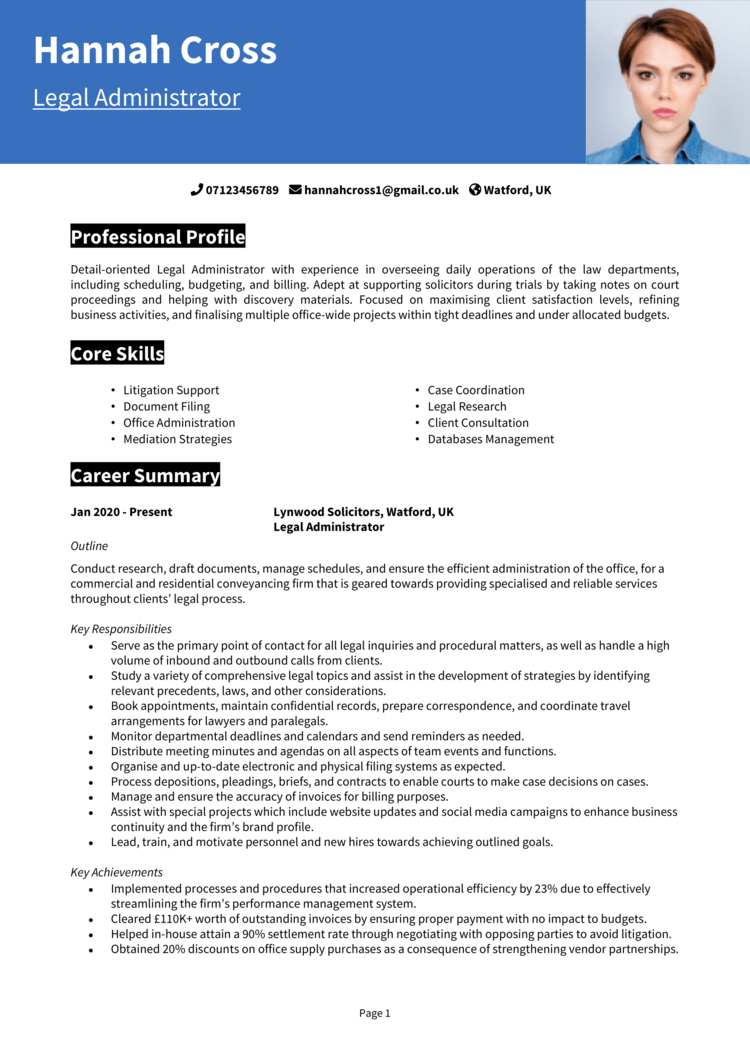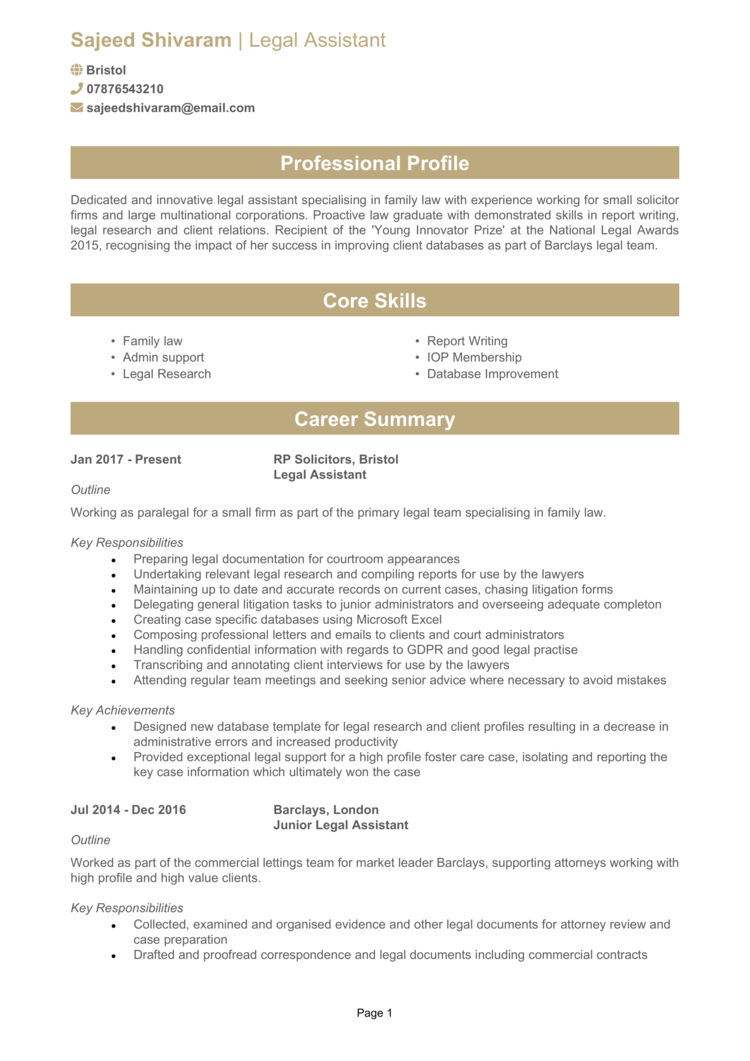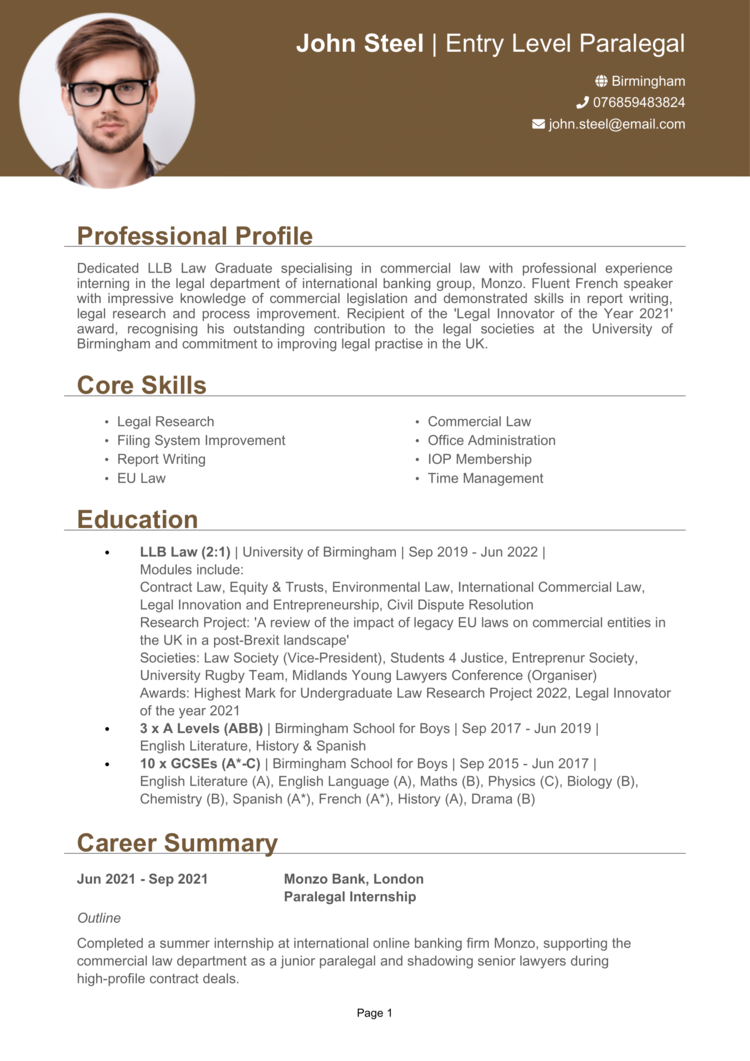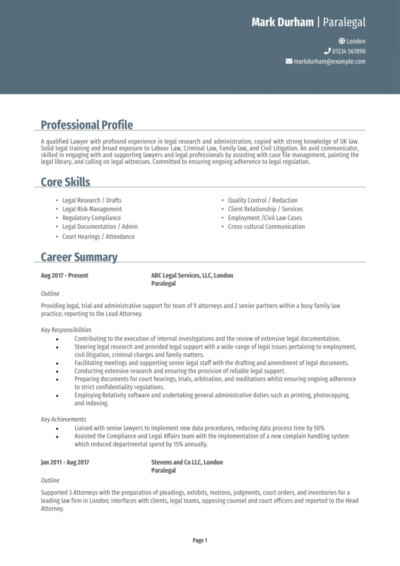Are you ready to bring order to the chaos of legal paperwork?
As a paralegal, you’re ensuring everything runs smoothly behind the scenes: a law firm’s success depends on you.
But before you start impressing lawyers, you need to impress recruiters with your CV. This guide, complete with 4 winning Paralegal CV examples, will best showcase your legal expertise and skills so you can secure your next big legal position.
Paralegal CV example

Legal Administrator CV example

Legal Assistant CV example

Entry Level Paralegal CV example

How to write your Paralegal CV
Learn how to create your own interview-winning Paralegal CV with this simple step-by-step guide.
A paralegal CV is about demonstrating your ability to manage case files, perform legal research, and support solicitors in delivering excellent client service.
This guide will show you how to write a CV that highlights your legal knowledge, attention to detail, and ability to handle the fast-paced demands of a legal environment.
How should you structure your Paralegal CV?


Your CV needs to be as logical and thorough as the case briefs you’ll handle. Recruiters and hiring managers will appreciate a clear structure that allows them to quickly identify your skills and qualifications.
Here’s how to structure your Paralegal CV:
- Name and contact details – Personal details go at the top, making it easy for potential employers to contact you. Adding a photo is entirely optional.
- Profile – Start with a concise summary of your legal experience, specialisations, and career goals.
- Core skills – Briefly showcase your abilities, from legal research to document drafting, with a few bullet points.
- Work experience – Present your professional history in reverse chronological order, focusing on your legal contributions and achievements.
- Education – Highlight your legal qualifications, such as law degrees or paralegal certifications.
- Additional info – This optional section can include hobbies and interests that reflect skills like analysis or attention to detail.
The best way to format your Paralegal CV


A messy CV is like a brief with typos – no matter how strong the content is, it’s not going to win over the judge (or recruiter). Keep it clean and professional to make your case airtight: avoid preventable mistakes.
A clean, readable layout ensures recruiters focus on your skills and experience, not the formatting.
Here’s how to format your Paralegal CV effectively:
- Bullet points – Recruiters will appreciate it if you break down your responsibilities and achievements into clear, impactful lines.
- Divide sections – Use consistent headings and spacing to organise your information logically.
- Use a clean font – Choose a simple, professional font that enhances readability and exudes professionalism.
- Keep it the right length – 2 pages is plenty to cover your expertise while keeping the recruiter engaged.
Paralegal CV profile


Your profile is where you make your first argument – why you’re the ideal paralegal for the role. The aim is to convince a recruiter that hiring you would genuinely benefit their company.
Different law firms look for slightly different qualities in their employees, so make sure you tailor your profile to reassure the recruiter that you’re the right fit.
Paralegal CV profile examples
Profile 1
Organised Paralegal with four years of experience in civil litigation, specialising in case preparation, drafting legal documents, and conducting research. Skilled in using legal research tools such as Westlaw and LexisNexis to provide accurate and timely support for solicitors and clients.
Profile 2
Dedicated Paralegal with three years of experience in family law, adept at drafting affidavits, managing court filings, and supporting clients through legal proceedings. Experienced in handling sensitive information with discretion and professionalism while maintaining detailed case records.
Profile 3
Experienced Paralegal with over seven years of expertise in corporate law, focusing on contract drafting, due diligence, and compliance. Skilled in reviewing complex legal documents and coordinating with cross-functional teams to ensure regulatory adherence. Proficient in legal management software and workflow automation tools.
What to include in your Paralegal CV profile
Here are some tips on what to put in your Paralegal CV profile:
- Where you’ve worked – Note the types of law firms, organisations, or legal teams you’ve supported.
- Your top qualifications – Show off your degrees, diplomas, or certifications that bolster your legal knowledge.
- Key legal skills – Include expertise in areas like document preparation, legal research, or contract review.
- Areas of law you specialise in – Reference your experience in fields like family law, intellectual property, or litigation.
- Stakeholders you’ve collaborated with – Highlight your interactions with solicitors, clients, and court officials.
How to present your core skills section properly


Your core skills section is like your legal toolkit – it should immediately show recruiters that you have the expertise to succeed. Focus on technical skills that prove you’re ready to handle complex legal tasks.
Most important skills for a Paralegal
- Legal Research – Conducting thorough research using online databases and legal libraries to support case preparation.
- Document Drafting – Preparing legal documents, including contracts, affidavits, and court filings, with precision.
- Case Management – Organising case files, tracking deadlines, and maintaining up-to-date records.
- Client Communication – Liaising with clients to gather information, explain processes, and provide updates.
- Court Filing – Preparing and submitting documents to courts, ensuring compliance with procedural rules.
- Contract Review – Analysing contracts for accuracy, legal compliance, and potential risks.
- Team Collaboration – Assisting solicitors and legal teams with administrative and procedural tasks.
- Confidentiality Compliance – Managing sensitive information in line with data protection regulations and legal ethics.
- Litigation Support – Preparing trial bundles and exhibits to support legal proceedings.
- Regulatory Knowledge – Staying up-to-date on changes in legislation and regulatory requirements.
Work experience


Your work experience section is where you prove you’ve put your legal knowledge into action. Whether you’ve worked for a small law firm or a corporate legal department, focus on the value you brought to the team.
Even if your legal experience is more ‘intro to law’ than ‘landmark case,’ you can still highlight internships or pro bono work (or even that time you helped a friend navigate a sticky tenancy dispute).
How to structure jobs

- Outline – Briefly describe the law firm or organisation, your role, and the type of cases or projects you worked on.
- Responsibilities – Highlight key tasks, such as managing case files, conducting research, or drafting contracts.
- Achievements – Include measurable outcomes, like reducing case preparation times or increasing the accuracy of filings.
Example jobs for Paralegals
Paralegal | Justice Path Legal Services
Outline
Supported solicitors in civil litigation cases, focusing on case preparation, legal research, and managing documentation. Worked in a fast-paced legal firm handling multiple cases simultaneously.
Responsibilities
- Drafted and reviewed legal documents, including pleadings, motions, and contracts.
- Conducted thorough legal research using Westlaw and LexisNexis to support case strategies.
- Organised and maintained case files, ensuring accuracy and accessibility for solicitors.
- Coordinated with clients to gather necessary documents and information.
- Assisted solicitors in court proceedings by preparing trial bundles and evidence summaries.
Achievements
- Increased case preparation efficiency by 25 percent through improved filing systems.
- Successfully supported over 50 litigation cases within a two-year period.
- Recognised for drafting high-quality legal documents with minimal revisions required.
Paralegal | Family First Legal Support
Outline
Worked in a family law department, assisting solicitors in handling cases related to divorce, custody, and domestic disputes. Provided compassionate support to clients while managing sensitive legal processes.
Responsibilities
- Drafted affidavits, witness statements, and court orders in family law cases.
- Filed legal documents with the court, ensuring adherence to strict deadlines.
- Liaised with clients to provide updates and collect essential case information.
- Prepared case summaries and timelines to assist solicitors in court proceedings.
- Managed confidential client files, maintaining compliance with GDPR and legal ethics.
Achievements
- Reduced filing errors by 15 percent through meticulous attention to detail.
- Improved client satisfaction ratings by 20 percent with clear communication and updates.
- Recognised for consistently meeting court deadlines and ensuring smooth case management.
Paralegal | Corporate Counsel Associates
Outline
Provided paralegal support in a corporate legal department, focusing on contract management, regulatory compliance, and due diligence for mergers and acquisitions. Contributed to ensuring legal accuracy and efficiency in corporate transactions.
Responsibilities
- Reviewed and drafted contracts, NDAs, and other legal agreements.
- Conducted due diligence for mergers and acquisitions, identifying potential legal risks.
- Maintained contract databases and ensured timely renewals and compliance checks.
- Collaborated with cross-departmental teams to provide legal support on business initiatives.
- Prepared reports summarising compliance requirements and legal updates.
Achievements
- Streamlined contract review processes, reducing turnaround times by 20 percent.
- Contributed to the successful completion of a £50M acquisition by managing due diligence.
- Praised by legal counsel for accuracy and thoroughness in legal documentation.
How to write your education section


The education section is crucial for showcasing the legal knowledge and qualifications required for a paralegal role.
Include academic achievements like law degrees, paralegal diplomas, or certifications. For those newer to the field, highlight coursework, internships, or research projects that demonstrate your potential.
List qualifications in reverse chronological order, starting with the most recent.
Best qualifications for Paralegals
- Bachelor’s Degree in Law (LLB) – Provides a comprehensive foundation in legal principles and practices.
- Level 3 Certificate in Paralegal Practice – Focuses on practical skills for supporting solicitors and legal teams.
- Advanced Legal Research Certification – Demonstrates expertise in conducting thorough legal research.
- Certified Paralegal (NALA) – A professional certification recognising advanced knowledge and skills.
- Diploma in Legal Studies – Covers essential legal concepts and procedures for aspiring paralegals.





